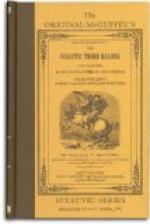4. Across an ant-hill led
The king’s path,
and he heard
Its small folk, and
their word
He thus interpreted:
5. “Here comes the king men greet
As wise and good and
just,
To crush us in the dust
Under his heedless feet.”
6. The great king bowed his head,
And saw the wide surprise
Of the Queen of Sheba’s
eyes
As he told her what they said.
7. “O king!” she whispered sweet,
“Too happy fate
have they
Who perish in thy way
Beneath thy gracious feet!
8. “Thou of the God-lent crown,
Shall these vile creatures
dare
Murmur against thee
where
The knees of kings kneel down?”
9. “Nay,” Solomon replied,
“The wise and
strong should seek
The welfare of the weak;”
And turned his horse aside.
10. His train, with quick alarm,
Curved with their
leader round
The ant-hill’s
peopled mound,
And left it free from harm.
11. The jeweled head bent low;
“O king!”
she said, “henceforth
The secret of
thy worth
And wisdom well I know.
12. “Happy must be the State
Whose ruler heedeth
more
The murmurs of
the poor
Than flatteries of the great.”
Definitions.—4. In-ter’pret-ed, explained the meaning of. 5. Greet, Address, salute. 9. Wel’fare, happiness. 10. Train, a body of followers. 12. Flat’ter-ies, praises for the purpose of gratifying vanity or gaining favor.
LXXVI. RIVERMOUTH THEATER. (213)
From “The Story of a Bad Boy,” by Thomas Bailey Aldrich. The author was born at Portsmouth, N. H., in 1836. When quite young his family moved to Louisiana, but he was sent back to New England to be educated, and later he located at New York. He is a well-known writer of both prose and poetry.
1. “Now, boys, what shall we do?” I asked, addressing a thoughtful conclave of seven, assembled in our barn one dismal, rainy afternoon. “Let’s have a theater,” suggested Binny Wallace.
2. The very thing! But where? The loft of the stable was ready to burst with hay provided for Gypsy, but the long room over the carriage house was unoccupied. The place of all places! My managerial eye saw at a glance its capabilities for a theater.
3. I had been to the play a great many times in New Orleans, and was wise in matters pertaining to the drama. So here, in due time, was set up some extraordinary scenery of my own painting. The curtain, I recollect, though it worked smoothly enough on other occasions, invariably hitched during the performances.
4. The theater, however, was a success, as far as it went. I retired from the business with no fewer than fifteen hundred pins, after deducting the headless, the pointless, and the crooked pins with which our doorkeeper frequently got “stuck.” From first to last we took in a great deal of this counterfeit money. The price of admission to the “Rivermouth Theater” was twenty pins. I played all the principal characters myself—not that I was a finer actor than the other boys, but because I owned the establishment.




